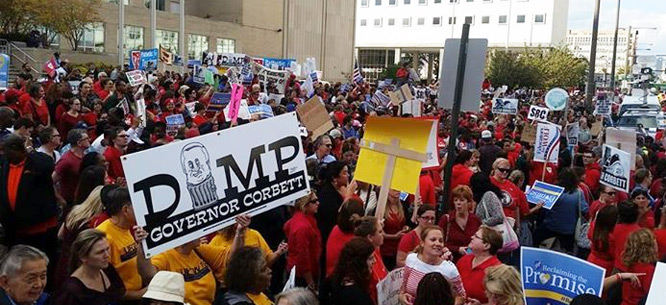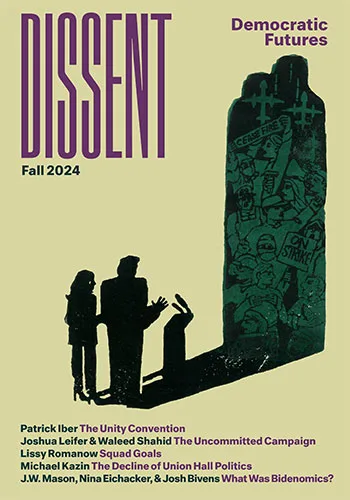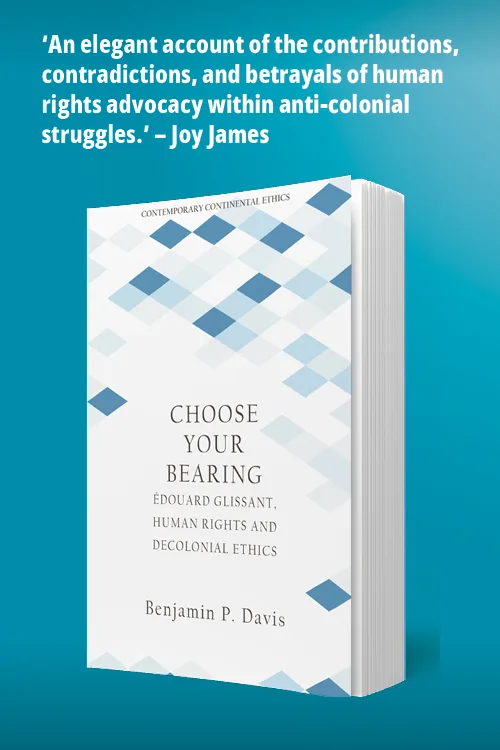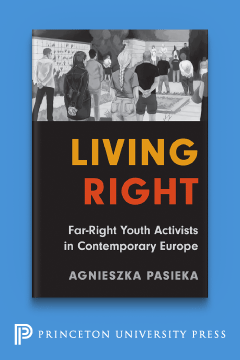Philadelphia to Corporate Ed Reformers: No Contract, No Peace
Philadelphia to Corporate Ed Reformers: No Contract, No Peace

In a move that sets a worrying precedent for labor–management relations across the country, Philadelphia’s School Reform Commission (SRC), a five-member unelected school governing board, stunned the city on October 6 when it announced that its members had unilaterally decided to cancel the Philadelphia Federation of Teachers (PFT) contract.
The SRC cast its vote during a meeting called with minimal notice in the middle of the school day. At the beginning of the meeting, SRC chairman Bill Green, a former city council member appointed by Republican governor Tom Corbett, reminded the audience that the school district still had a budget shortage. He went on to point out that many individuals—members of school district unions and Philadelphia families—had already made sacrifices to help the city’s resource-starved schools. Green believed it was time for the PFT to “share in the sacrifices that everyone else has made.” Less than ten minutes after the meeting began and without any debate on the issue, the SRC members unanimously agreed to terminate the teachers’ contract.
When reports of the decision surfaced, the PFT immediately denounced the SRC’s actions. Many accused the SRC of deliberately planning the meeting during the school day to avoid public dissent. Over the week that followed, outrage erupted throughout the city. Reports have surfaced that the PFT has received numerous phone calls from teachers who want to resign.
And indeed, after years of working in classrooms that lack the basic resources for teaching and learning, now rewarded by having their contract terminated by an unelected school board, why would they stay?
The SRC’s decision to terminate the PFT’s contract in this manner is part of a larger national effort to blame teachers and their unions for the failures of our nation’s urban schools. Like their counterparts in Wisconsin and Chicago, the SRC and its political allies justified its decision by focusing on the one element that seemed extravagant: the fact that teachers did not contribute to their health care plan. This attack played into a long-standing and increasingly popular image of the entitled public school teacher who has always enjoyed shorter days, more vacation, and better benefits than other workers.
Earlier this year, school district officials announced plans to implement “innovative” educational practices and expand the number of high-quality schools under its jurisdiction. The Philadelphia Schools Partnership (PSP), which is part of a national network of corporate reformers, has supported these initiatives with funds that they collect from philanthropists and big business. Built on desperation for money, the alliance between school officials and PSP leaders is rife with problems. Most troubling is the PSP’s stance on the PFT.
The school district officials and PSP staff clearly recognize that the city’s ability to attract and retain talented teachers is critical to the long-term success of their reforms. Yet the SRC’s decision and PSP’s platform have crushed teacher morale throughout the city.
In the spring meeting of the American Educational Research Association, Mark Gleason, the executive director of PSP, made national headlines when he told listeners that he wanted to “dump the losers,” which was a reference to teachers in struggling schools. In the same speech, Gleason argued that teachers’ unions, with their bloated pensions and extravagant benefits, had contributed to the failures of urban schools. In mid-October, PSP aired a radio advertisement echoing Gleason’s sentiments.
It’s hardly surprising that after having their union rights trampled and being insulted in attack ads, Philadelphia teachers are ready to quit. But most of them have so far stayed in their overcrowded and under-resourced classrooms. And they are by no means resigned to the direction the SRC and the PSP have imposed on their school district. Nor, it seems, are their students.
Since losing their right to strike more than a decade ago under a state law, Philadelphia teachers have been actively creating spaces in and outside of their union to publicly challenge SRC decisions like the one made last week. When teachers learned about the SRC’s actions, they channeled their anger and frustration with the SRC and other school leaders through grassroots activist organizations such as the PFT’s Caucus of Working Educators and the nationally recognized Teacher Action Group. These organizations targeted the SRC’s claim that teachers themselves have not made sacrifices and urged PFT members to calculate the money that they have personally spent to provide school supplies and the pay that they have lost due to salary freezes that the district instituted to reduce costs.
Launched last spring, the Caucus of Working Educators grew out of conversations that PFT members had in their schools, school district events, and grassroots teacher networks such as the Teacher Action Group and Teachers Lead Philly. The caucus aims to bring a social justice approach to the PFT and bolster grassroots participation, both within the union’s membership and beyond. Philadelphia youth, families, and residents—even though they are not considered full members with voting rights—are welcomed and encouraged to participate in the caucus and spread the word about its work. Since its founding, the caucus has sponsored events to educate its members about the current state of school reform in Philadelphia and beyond. Its members have testified at the SRC meetings to challenge its policies and decisions, including the one that terminated the PFT’s contract.
Meanwhile, building on a long history of youth activism in our city, two Philadelphia high-schoolers, Cy Wolfe and Leo Levy, took the fight against corporate ed reform into their own hands: they organized a school walkout using the hashtag #studentsforteachers on social media.
On Wednesday, October 8, hundreds of youth from Science Leadership Academy and the High School for Creative and Performing Acts, two of city’s high-performing selective high schools, did what their teachers could not: they went on strike. In a television interview with a local CBS station, one of the youth who walked out reminded listeners that the SRC has already cut school nurses, counselors, and librarians to reduce costs. The line, he argued, “stops with our teachers.”
The youth who marched out of their schools made clear their opposition to the SRC’s decision to terminate the PFT contract and mandate policies that threatened one of the only strengths of our current school system: their teachers. Students at the Science Leadership Academy walked up and down 22nd Street with homemade signs, chanting: “Who are we? Students! Who do we love? Our teachers!” Some two hundred students at the city’s Creative and Performing Arts High School, including a boisterous group of brass players, marched over to Broad Street, Philadelphia’s main thoroughfare.
Reports surfaced later in the day that many of these students had turned in their homework or emailed their teachers to let them know that they would not be in class before hitting the picket lines. Teachers responded with appreciation and pride, posting photos and videos of their students on the streets. The strike called national attention to the SRC’s cowardly back-door decision.
This past week, the legality of that decision went to the Commonwealth Court, who may hear the case brought by the PFT against the school district as early as December. On Monday, October 28, Common Pleas Court judge Nina Wright Padilla wrote an injunction that stalled benefit changes until the court rules on this case. While the PFT and school district officials stated that they were satisfied with the court’s decision, the students, families, and educators who protested and walked out of their schools wanted more: they wanted the SRC to listen to their dissent about the lack of transparency and public debate in the decisions that impact their schools.
It’s high time for the SRC to listen to these youth and their teachers, and reinstate a governance system that welcomes public debate. In theory, that’s something everyone—from corporate ed reformers like PSP’s Mark Gleason to the Philadelphia teachers union he wants to destroy—can agree on. Whether Philadelphia officials will respect the democratic process in practice is another question.
Erika Kitzmiller is the National Academy of Education/Spencer Foundation post-doctoral fellow at Harvard University’s Hutchins Center. She is currently finishing a book manuscript, The Roots of Educational Inequality: Germantown High School, 1907–2014, on the historical transformation of American high schools and the escalation of educational inequality over the course of the twentieth century.





